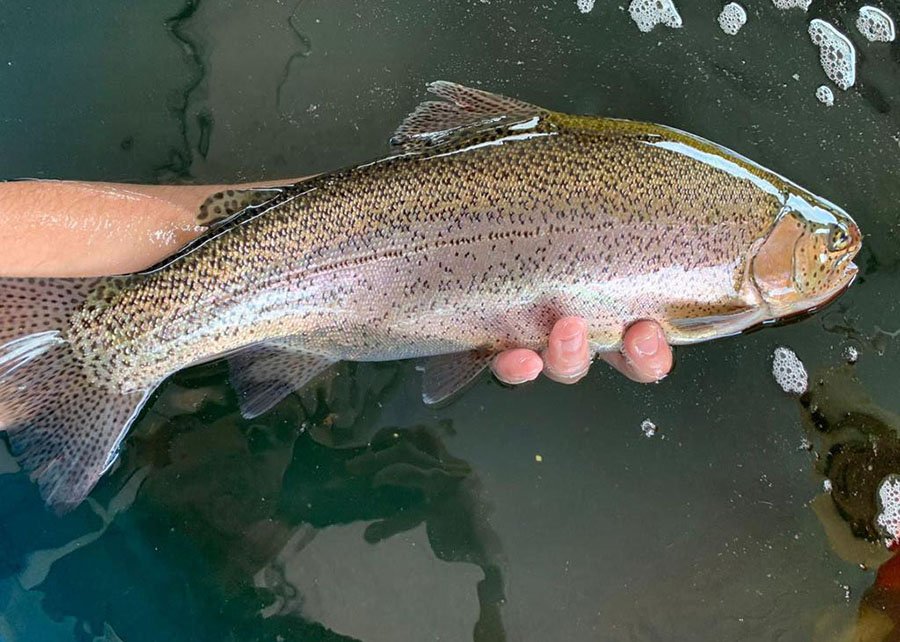
Rainbow trout is a popular freshwater fish, appreciated for its delicious taste and rich nutritional profile. But did you know that a common kitchen spice could further enhance its nutritional benefits?
A study conducted by Trakia University (Bulgaria) evaluated the effect of dietary supplementation with cinnamon (Cinnamomum verum Presl) on the chemical composition of the meat and fatty acid profile in rainbow trout (Oncorhynchus mykiss), cultured in a recirculating system.
Why consider plant-based additives?
Traditionally, fish feed supplements aimed to improve factors like taste, texture, and water solubility. However, there is growing interest in natural alternatives to antibiotics. Plant extracts, known as phytogenic additives, offer several advantages:
Antimicrobial and antioxidant properties: Studies suggest that various plants possess natural antimicrobial and antioxidant properties, potentially improving fish health and reducing the need for antibiotics.
Safety for fish, humans, and the environment: Unlike antibiotics, phytogenic additives are generally considered safe for fish, human consumers, and the environment due to their natural origin.
Study Design
While research on phytogenic additives often explores their effect on fish growth and blood parameters, the impact on meat quality remains less understood. This study aimed to fill this gap by investigating how dietary supplementation with cinnamon affects the chemical composition and fatty acid profile of rainbow trout meat.
Researchers studied how the inclusion of cinnamon (Cinnamomum verum Presl) in the diet of rainbow trout (Oncorhynchus mykiss) affects the chemical composition and fatty acid profile of their meat. The study involved 120 trout divided into two groups: a control group (C) and an experimental group (C.v). Both groups were raised in a recirculating aquaculture system for 60 days. The C.v group received feed supplemented with 1% powdered cinnamon extract, while the control group received standard feed.
Cinnamon: A Spice with Potential
Cinnamon, a popular culinary ingredient, boasts a rich history and diverse properties. It contains vitamins, minerals, and phenolic compounds with potential health benefits, such as anti-inflammatory and antioxidant effects. While its effects on the performance of fish like tilapia have been explored, its impact on meat quality, particularly fatty acid profiles, remains under-investigated.
Impact on Trout Weight
Interestingly, cinnamon supplementation appeared to have a positive effect on the weight gain of the trout. While the initial weight between both groups was similar, the C.v group fed with cinnamon showed a slightly higher final weight compared to the control group.
Stay Always Informed
Join our communities to instantly receive the most important news, reports, and analysis from the aquaculture industry.
Cinnamon for Healthier Fish?
Fatty acids are crucial for human health, and fish are a great source of beneficial types. Here’s a breakdown of key terms:
- SFA (Saturated Fatty Acids): These can raise bad cholesterol levels. The study found a decrease in SFA levels in trout fed with cinnamon.
- UFA (Unsaturated Fatty Acids): Generally considered good for heart health. The cinnamon group experienced an increase in UFA content.
- PUFA (Polyunsaturated Fatty Acids): These include Omega-3 and Omega-6 fatty acids, essential for brain function and reducing inflammation. Trout fed with cinnamon had higher levels of PUFA, particularly Omega-3.
- PUFA/SFA Ratio: A higher ratio indicates a healthier fat profile. The cinnamon group had a significantly improved PUFA/SFA ratio.
- n-6/n-3 Ratio: A balanced ratio of Omega-6 to Omega-3 is crucial for overall health. Trout fed with cinnamon achieved a more balanced n-6/n-3 ratio.
What does this mean for trout farmers?
These findings suggest that including cinnamon in rainbow trout feed could result in fish with a healthier fatty acid profile. This translates to potential health benefits for consumers who enjoy rainbow trout as part of their diet.
While this study offers promising results, more research is needed to fully understand the long-term effects of cinnamon in rainbow trout diets and to optimize cinnamon supplementation strategies for commercial aquaculture.
Conclusion
This study investigated the impact of adding cinnamon extract to the diet of rainbow trout raised in recirculating systems. While the overall chemical composition of the fish meat (water, protein, fat, ash) remained unchanged, the fatty acid profile showed significant improvements.
In summary, incorporating cinnamon extract into the diet of rainbow trout appears to be a promising strategy for enhancing nutritional benefits. By promoting a healthier fat profile rich in omega-3 and maintaining a balanced n-6/n-3 ratio, cinnamon supplementation could contribute to creating a more nutritious product for consumers.
Contact
G. Zhelyazkov
Department of Livestock-ruminants and technologies of animal products, Faculty of Agriculture, Trakia University
6000 Stara Zagora, Bulgaria
Email: georgi_ij@abv.bg
Reference (open access)
Zhelyazkov, G., & Stoev, T. (2024). Effect of dietary supplementation of cinnamon (Cinnamomum verum Presl) extract to rainbow trout (Oncorhynchus mykiss W.) feed on the chemical and fatty acid profile of meat. AGRICULTURAL SCIENCE AND TECHNOLOGY, 16(2), 96-103.
Editor at the digital magazine AquaHoy. He holds a degree in Aquaculture Biology from the National University of Santa (UNS) and a Master’s degree in Science and Innovation Management from the Polytechnic University of Valencia, with postgraduate diplomas in Business Innovation and Innovation Management. He possesses extensive experience in the aquaculture and fisheries sector, having led the Fisheries Innovation Unit of the National Program for Innovation in Fisheries and Aquaculture (PNIPA). He has served as a senior consultant in technology watch, an innovation project formulator and advisor, and a lecturer at UNS. He is a member of the Peruvian College of Biologists and was recognized by the World Aquaculture Society (WAS) in 2016 for his contribution to aquaculture.







